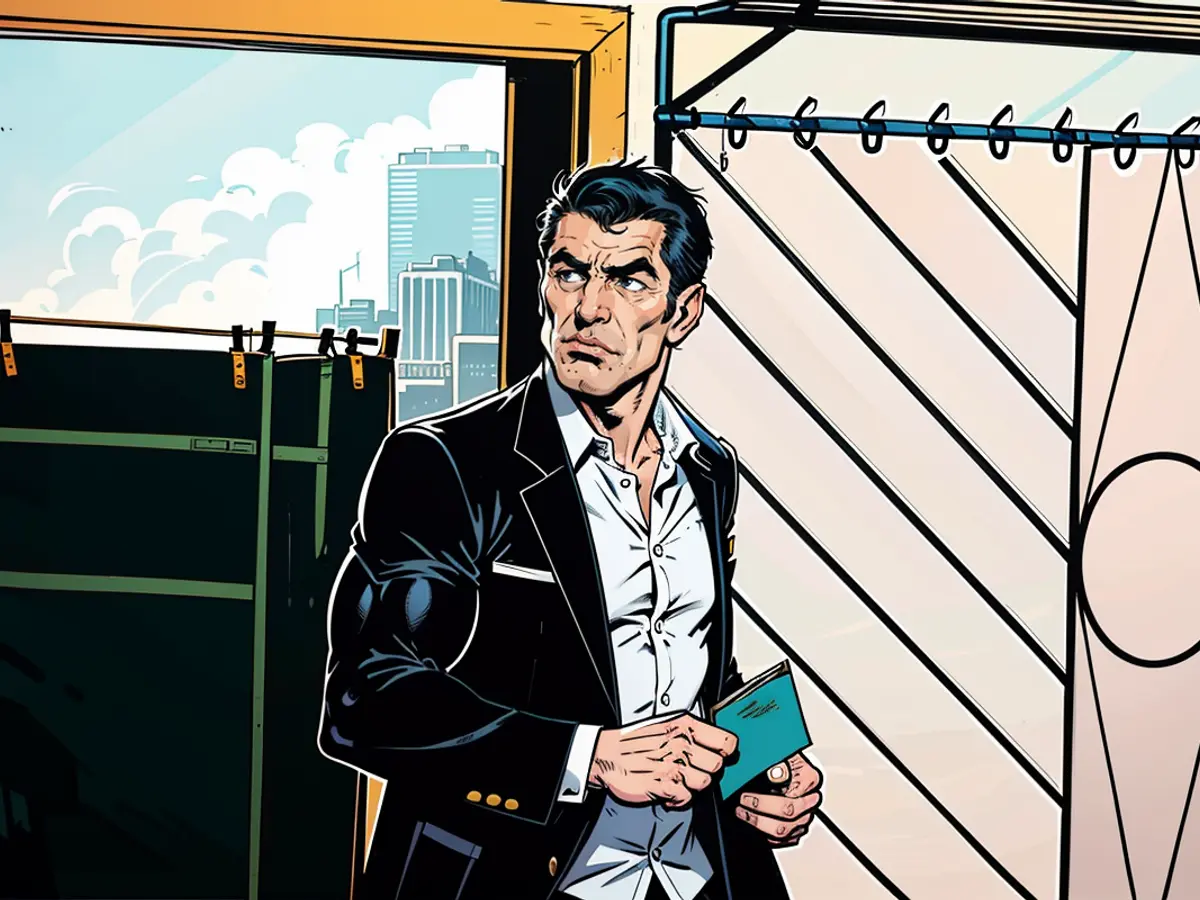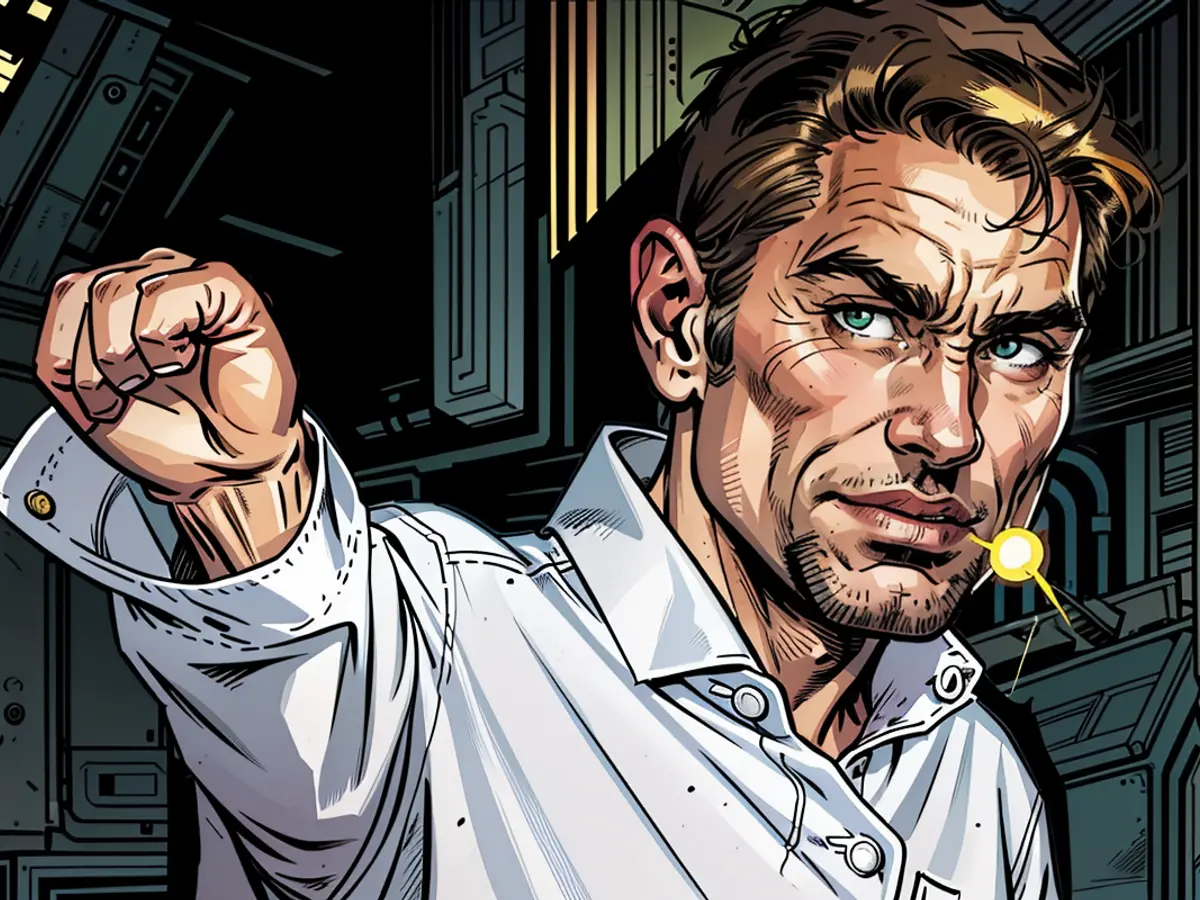In the realm of Saxony, the mayor of Grimm emerges victorious in a direct vote.
Mayor of Grimma, Matthias Berger, Clinches Seat in Saxony State Parliament for Free Voters Party The mayor of Grimma, Matthias Berger, obtained a seat in the Saxony state parliament for the Free Voters party in the state election. According to data from the state election commission, Berger secured a direct mandate in Leipzig region's third electoral district, garnering 36.6% of the votes. Berger served as the flagbearer of the Free Voters locally, and nationwide, the party only received 2.3% of the second votes.
Political Scientist Ponders Feasibility of Minority Government in Saxony A Leipzig political scientist, Hendrik Träger, posits that a minority government of CDU and SPD in Saxony, supported by the Alliance for Progress and Social Justice (BSW), is an option worth exploring. According to Träger, with the BSW's deputies merely abstaining in votes, CDU and SPD could govern with a relative majority. Such government structures are common in Scandinavian countries, and it's advisable to observe international practices in this regard.
Formation of Government in Erfurt Discussed, Ramelow Offers Voigt Support Thuringia's Minister President Bodo Ramelow has agreed to support CDU state chairman Mario Voigt in forming a majority government in Erfurt state parliament. Ramelow emphasizes the need for a functional government, even if he won't be a part of it. He intends to support candidates who possess the mandate from voters to form a majority government. In this instance, the candidate is Voigt. Ramelow's motivations stem from preventing a parliamentary blackmail situation where the AfD drives all other parties.
AfD Secures Seats in Thuringian Parliament Even Without Direct Candidates Despite the AfD securing victories with direct candidates in 29 of 44 electoral districts, faction leader Björn Höcke lost to CDU politician Christian Tischner in the Greiz II electoral district. The strong second vote result of 32.8% for the AfD guarantees more seats in the state parliament. Nevertheless, Höcke, who leads the state list, will take up his seat in the state parliament.
AfD Wins Most Votes in Thuringia State Election, But No Cooperation Offered In Thuringia, the AfD became the first-ever party to win a majority of votes in a state election, finishing with a clear plus of 32.8%. However, with no democratic party willing to form a coalition with the AfD, they won't be able to enact their claims. As the second-strongest force, the CDU will likely initiate talks with the Left Party to form a stable government coalition.
Left Party Secures Direct Seats in Saxony State Parliament Despite Failing to Clear Five-Percent Hurdle The Left Party managed to secure two direct seats in Leipzig in the Saxony state election. The peculiarities of Saxony's electoral system allowed the Left Party to enter the parliament, as projections indicate. The Left's entry into the state parliament means that the Kenya coalition of CDU, Greens, and SPD no longer holds a majority.
Green Party Leader Links Migration and Ukraine to Election Results Green Party leader Omid Nouripour attributes the results of the state elections in Saxony and Thuringia primarily to the issues of migration and the Ukraine conflict. While the federal government is taking action on these matters, the coalition is undermining itself due to unnecessary strife.
Thuringia: CDU, BSW, and SPD Lack Majority, Lean Towards Left Party Cooperation In Thuringia, the former red-red-green minority coalition under Minister President Ramelow has disbanded. Since no party is willing to collaborate with the AfD, the likeliest scenario for a government coalition is an alliance of CDU, BSW, and SPD. However, according to current projections, this constellation is short of one seat to achieve a majority in the state parliament, so they'd rely on the Left Party.

CDU's Voigt Misses Direct Seat in Thuringia State Election CDU's top candidate Mario Voigt failed to secure a direct seat in the Thuringia state election. He finished second in the Saale-Holzland district II, with 37.4% of the votes, falling short of AfD candidate Wiebke Muhsal, who received 39.2% of the votes. In the 2019 state election, Voigt had secured a direct seat.
22:07 Thuringia: Many Young Voters Opt for AfDOver a third of young voters in Thuringia opted for the AfD, a party labeled as right-wing extremist by the domestic intelligence agency. As per data collected by infratest-dimap for ARD, 38% of 18-24 year-olds in Thuringia supported the AfD. The Left Party garnered 16%, the CDU 13%, and the Greens recorded the poorest results among young voters with only 6% of the votes.
21:39 Kretschmer Wins Direct Seat in Saxony, Yet CDU StrugglesSaxony's Chief Minister Michael Kretschmer clinched the direct seat in Görlitz II with 47.2% of the votes, surpassing his AfD competitor who gained 39.4%. Despite this victory, Kretschmer's party fared worse in his constituency, securing 34.2% of the votes, behind the AfD which received 37.3%.
21:32 Saxony: Projections Favor CDUIn the latest projections released by both ARD and ZDF, the CDU holds a clear advantage over the AfD in Saxony. According to Infratest Dimap (ARD) and the Research Group Wahlen (ZDF), the CDU is approximately 1 percentage point ahead with 31.5 to 31.8%, compared to the AfD's 30.4 to 30.8%. Initially, the Research Group Wahlen suggested a close race between the CDU and the AfD. However, the AfD steadily caught up, thus causing a slight CDU lead. However, only ARD maintained this consistent lead in their projections.
21:21 Thuringia: Ramelow's Ambition Unlikely to MaterializeThe Left Party has faced substantial losses in the Thuringia state elections, leading Minister President Bodo Ramelow to potentially step down. One of Ramelow's aspirations for the evening - ensuring that the AfD does not secure at least a third of the votes to block decisions requiring a two-thirds majority - seems unlikely to occur as the AfD effectively achieved this.
21:13 SPD Remains Stable, Despite StrugglesIn spite of the poor performances in the Thuringia and Saxony state elections, Federal Chancellor Olaf Scholz can still rely on his party's, the SPD's, support, as per SPD leader Lars Klingbeil's statements to ZDF. According to Klingbeil, "I, as the party chairman, expect everyone to work even harder now." The party must collectively strive to regain lost voters. Klingbeil emphasized, "Everyone must now make an effort to improve the situation."
21:02 Kubicki Criticizes 'Traffic Light' Coalition Following LossesFDP deputy chairman Wolfgang Kubicki has called for consequences in response to the 'traffic light' coalition parties' poor performances in the Saxony and Thuringia elections. Kubicki wrote on "X" that "the election results indicate: the 'traffic light' coalition has lost its legitimacy." If a significant portion of voters reject the coalition in this manner, there must be consequences, Kubicki suggested, expressing the public's belief that "this coalition is damaging the country." The FDP failed to surpass the 5% threshold in both state elections and is now projected to be merely 1% away.

20:41 Höcke Misses Direct Mandate in ThuringiaThe AfD's parliamentary group leader, Björn Höcke, has been unsuccessful in securing a direct seat in the Thuringia state parliament. According to ntv information, the AfD will obtain Höcke's seat in the state parliament by having another MP step down in favor of Höcke.
20:37 Left Party Set to Enter Saxony Parliament despite Lower Voter SupportDespite significant losses, the Left Party remains on track to be a part of the Saxony state parliament. Although they failed to clear the 5% hurdle with second votes, they are currently projected to attain 4.3% in ZDF's latest estimate. However, two Left Party direct candidates in Leipzig districts exhibit comfortable leads over their competitors. Should they win their districts, they could potentially secure several seats in the new state parliament for their party. These two potential winners could also secure the top positions on their party's state list, denying the CDU, SPD, and the Greens their majority, leaving Minister President Kretschmer requiring the BSW for a governing majority.
20:17 Prediction for Saxony: CDU's edge over AfD is minimalBased on the latest report from ZDF, the CDU in Saxony has only a 0.1 percentage point advantage over the AfD. The Christian Democrats stand at 31.5%, while the AfD, categorized as far-right by the country's domestic intelligence agency, is at 31.4%. In Thuringia, it appears that the AfD has managed to surpass the CDU in the projections. The Greens are currently at 5.1% in Saxony and are uncertain about their seat count in parliament. The Left Party, predicted at 4.3%, has slim chances of making it. The SPD, with 7.6%, is secure in the state parliament.
19:56 Thuringia: Höcke's direct seat in parliament could be jeopardizedThe AfD faction leader Björn Höcke's direct entry into the Thuringia state parliament is under threat. After 68 of 74 electoral districts have been tallied, the CDU candidate Christian Tischner is leading with 42.3% of the votes, surpassing Höcke, who has 40.4%. If Tischner wins the majority in the Greiz II electoral district, Höcke will not secure a direct mandate and will rely on a seat via the state list, where he is first on the AfD's list. However, if many AfD direct candidates are triumphant, no one will enter parliament via the state list.
19:50 Höcke on AfD's success: "The wall strategy has fallen flat"In Thuringia, the AfD appears set to enter the state parliament as the dominant force. "The wall strategy has failed," concludes the party's top candidate, Björn Höcke. In an interview with ntv, he considers the election outcome a "historic achievement" and discusses the forthcoming government formation.
19:42 Ramelow on Left Party's struggles: "We've been eaten alive"Thuringia's Minister President Bodo Ramelow attributes the perceived "cannibalization" of his Left Party to two reasons: "Firstly, a CDU that has consistently equated the AfD and the Left, pushing 'exclusion' in our direction, despite sharing power with them for five years," the head of government said on ntv. He cites the BSW's announcement that they would secure 17% of the votes for the AfD, while in fact, they have now taken away their votes, as another factor contributing to the Left's decline. Ramelow could still celebrate the high voter turnout.
19:26 Nouripour on AfD's success: "My thoughts are with those who fear"The AfD is surpassing 30% in both Saxony and Thuringia's state elections, leaving the coalition parties in their wake. Green Party leader Omid Nouripour views the AfD's election result as a "pivotal moment" and a call to protect democracy together.

19:13 Recent projection for Saxony: CDU's victory narrowsThe latest ZDF projection places the AfD and the CDU neck and neck in Saxony: The Christian Democrats are only barely ahead with 31.7%, while the AfD garners 31.4% of the votes. The BSW comes in at 11.4%, the SPD at 7.8%. The Greens would be more securely in the state parliament with 5.5%, while the Left would miss the 5% threshold with 4.3%.
19:08 Wagenknecht eyes coalition with CDU and possibly SPD in ThuringiaBSW leader Sahra Wagenknecht aims for an alliance with the CDU and potentially also the SPD in Thuringia. "We very much hope that we will be able to form a good government alongside the CDU - likely also with the SPD," said Wagenknecht in the ARD. After five years of minority government, people yearn for a stable majority government that addresses concrete issues like the significant teacher shortages in Thuringia. Concurrently, they wish for a state government that advocates for peace, diplomacy, and opposes the deployment of US missiles in Germany. Wagenknecht rules out coalitions with the AfD for Thuringia.
19:02 Recent projection for Thuringia: AfD improves election result furtherA ZDF projection for the election result in Thuringia shows the AfD to be even more successful than the initial predictions. According to this, the extremist right-wing party is achieving 33.1% of the votes in the state. The CDU is at 24.3%, Sahra Wagenknecht's alliance is at 15%. The Left, which currently has Bodo Ramelow as the popular Minister President, is losing nearly 8 percentage points and is at 11.7%. The SPD is at 6.6%, and the Greens are at 4% of the votes.
18:56 Goring-Eckardt: AfD's Triumph is an Unforeseen Surprise in GermanyLeading German politicians from the Green Party are more uneasy than the Greens' loss in Thuringia suggests, given the success of the far-right extremists AfD in Thuringia. Katrin Goring-Eckardt, vice-president of the Green Bundestag, brands the success of the right-wing radicals as an "unforeseen surprise" in Germany. Party leader Omid Nouripour laments his party's failure as "insignificant, considering that the AfD has become the most powerful force in a state parliament."
18:48 Kretschmer on Saxony: "We Have Every Reason to Cheer"The incumbent Saxony Minister-President Michael Kretschmer views the CDU as the backbone of the government coalition. "We have every reason to cheer," said Kretschmer at his party's victory celebration. "Behind us are five grueling years," the people of Saxony have put their trust in the CDU and not cast a vote of protest. "We are aware of how disappointed the people are with what's happening in Berlin."
18:39 Estimate for Saxony: CDU's Edge over AfD NarrowsPreliminary estimates on ZDF suggest that the CDU's lead over the AfD in the Saxony state election is narrowing: The CDU now barely surpasses the AfD with 31.9 to 31.3 percent of the votes cast. The BSW secures 11.6 percent, the SPD 7.8. The Greens would likely miss out on the state parliament with 5.2 percent, while the Left with 4.5 percent would be excluded.
18:33 Weidel, AfD Leader, Demands Participation in Government for AfDThe chairwoman of the AfD federal party, Alice Weidel, demands full participation in government for her party in Thuringia and Saxony. "Typically, when complying with traditions in this country, the strongest party extends an olive branch, and that is the AfD," Weidel explains on ARD, focusing on Thuringia. "The electorate wishes for AfD involvement in government. We control 30 percent of the votes in both federal states, and without us, a stable government is unfeasible."

18:30 Kuhnert, SPD Secretary-General: "We Had a Chance of Being Ousted from the State Parliament"SPD Secretary-General Kevin Kuhnert acknowledges his party's modest results in the Thuringia and Saxony elections. "This is not a cause for celebration for the SPD," he explains on ARD. Nevertheless, his party has faced numerous challenges over the years. "There was a tangible risk of being ousted from the state parliaments," says Kuhnert. "Fighting is worth it, we are indispensable." A lot needs to change, Kuhnert notes, and emphasizes: more dialogue with voters. When asked about Chancellor Olaf Scholz, he replies: "We need to articulate our politics jointly."
18:23 Höcke, AfD Parliamentary Group Leader, Hails Result in Thuringia as "Historic Triumph"AfD parliamentary group leader Björn Höcke views the Thuringia result as "historic." The AfD is now the most popular people's party in the federal state, "the idiotic firewall nonsense needs to cease," claims Höcke on MDR. Change will only ensue with the AfD.
18:21 Chrupalla, AfD Party Leader, Describes Thuringia Victory as "Game Changer"AfD party leader Tino Chrupalla celebrates his party's results as groundbreaking, stating that a political shift has taken place in both federal states, as he tells ZDF. The AfD is reportedly willing to engage in talks with all parties. "In Saxony, we are on par with the CDU," he says, adding that the AfD wants to govern for the sake of Saxony.
18:17 Linnemann, CDU Secretary-General: No Coalition with AfDCDU Secretary-General Carsten Linnemann has ruled out any collaborations with the AfD in Thuringia or Saxony. "We are steadfast on this," he says on ARD. The CDU will now form governments from the center of the parliament, he assures, expressing confidence that this will be successful. The CDU, he says, remains the last bastion of democracy. The traffic light parties have been penalized, he adds.
18:13 Estimate for Saxony: CDU slightly ahead of AfD, BSW at 12 percent, Greens close to the edgeThe initial projection for the Saxony state election reveals the CDU with 31.5 percent of the votes cast, narrowly ahead of the AfD with 30 percent. The BSW ranks as the third strongest force with 12 percent, while the SPD remains in the state parliament with 8.5 percent. The Greens barely make it into the state parliament with 5.5 percent. The Left is excluded with 4 percent, and the FDP will not be part of the new parliament.
18:10 Estimate for Thuringia: AfD tops CDU, BSW will enter the state parliament with 16 percentThe initial projection for the Thuringia state election shows the AfD with 30.5 percent of the votes, surpassing the CDU with 24.5 percent and the Left with 12.5 percent. The SPD is represented in the state parliament with 7 percent, and the BSW will undoubtedly enter the state parliament with 16 percent. The Greens and the FDP are still below 5 percent.
18:01 AfD Dominates in Thuringia, BSW Gains in Double Digits in SaxonyAccording to the initial projections from the state election, the AfD emerges as the strongest force in Thuringia, as anticipated. The SPD manages to surpass the five percent threshold, while the Greens and FDP fail to do so. Conversely, in Saxony, the BSW manages to secure a double-digit result for the first time. The CDU is barely ahead of the AfD in the projections, while the Left and the FDP may not secure representation in the state parliament, with the Greens remaining.

17:18 Björn Höcke at Risk of Missing State ParliamentAfD's faction leader in Thuringia, Björn Höcke, may not secure a seat in the future state parliament. His party colleagues may even compromise his chances. Many of the AfD candidates in the constituencies have high chances of winning direct mandates. Contrarily, Höcke faces tough competition from the CDU candidate, Christian Tischner, in his constituency, Greiz II. If Tischner wins and the AfD secures more direct mandates than entitled, no one can enter via the state list, not even from the first place, which Höcke currently holds. In such a scenario, the AfD might persuade a successful direct candidate to relinquish their state parliament seat, allowing Höcke to secure his mandate.
16:48 Potential Absence of Media Coverage at AfD Election Party in ThuringiaThere's a high possibility that there won't be any media coverage of the AfD's election party in Thuringia. The party, classified as right-wing extremist by the domestic intelligence agency, attempted to exclude several media outlets from the event. However, a court prevented this, leading the state party to expel all press. A party spokesperson cited logistical reasons for the ban: There wasn't enough space at the venue for all the media representatives who had applied for accreditation.
16:29 High Mail-in Voter Turnout in Saxony's ElectionFor the election that Saxony's CDU Minister-President Michael Kretschmer termed a "crucial election" for the state, nearly a quarter of eligible voters have already cast their ballots by mail. The state election commissioner expects 24.6 percent of voters to have voted by mail. The voter turnout today was only slightly higher than in 2019 at early afternoon.
15:52 Höcke Votes in a Lada, Ramelow Votes with WifeThuringia's AfD state leader and top candidate, Björn Höcke, voted at noon. He arrived at the polling station in a Lada Niva, a Russian-made off-road vehicle. Höcke voted in Bornhagen in the Eichsfeld district.
Minister-President Bodo Ramelow voted in the state capital of Erfurt, accompanied by his wife, Germana Alberti vom Hofe. The 68-year-old has been the head of government in the Free State since 2014, with a brief interruption, most recently leading a minority coalition.
15:40 Higher Turnout than Last Time in Thuringia and SaxonyIn Thuringia, 44.4 percent of voters had cast their ballots by 2:00 PM. This is an increase of more than two points compared to the election five years ago. This indicates a high turnout. Mail-in voters are not yet included in these figures, as per the state election commissioner. In Saxony, the turnout was also higher than in 2019, albeit only slightly, at 35.4 percent. However, the election commissioner expects significantly more mail-in voters than in 2019. The polling stations in both states will close at 6:00 PM.
15:13 Kretschmer Hopes for 'Traffic Light' Parties in the State Parliament

14:40 Top Issues Driving Voter Choice in Saxony and ThuringiaNearly a third of people in Saxony and Thuringia plan to vote for the AfD in the upcoming September 1 elections. A large survey reveals insights as to why this is the case, highlighting the major concerns and issues. Migration is just one of them.
14:13 Höcke Exits Polling Station Quickly in ThuringiaAt the Thuringia state election, AfD's top candidate, Björn Höcke, voted around midday. He didn't stay long at the Bornhagen polling station and didn't interact with journalists on site. Since he had always lost to the CDU candidate in his home district of Eichsfeld, Höcke switched to the Greiz constituency. However, he also faces defeat against the CDU there.
13:50 Voting Participation in Thuringia similar to 2019 at MiddayIn Thuringia, voter turnout appears to be similar to the previous parliamentary election. According to the state election commissioner, around 32 percent of eligible voters had cast their ballots in polling stations by 12 pm. Mail-in voters are not included in these numbers. In 2019, voter turnout was 31.2 percent at this time. There also seems to be more interest in the state election than in the European and municipal elections held earlier this year. In June, voter turnout was 24.3 percent at the same time.
Anticipated High Voter Participation in Saxony's ElectionA substantial voter turnout is anticipated in the state election of Saxony. By lunchtime, 25.8% of eligible voters had voted, as reported by the Statistical State Office in Kamenz. During the 2019 state election, the turnout was marginally higher at 26.2%. Mail-in ballots are not yet accounted for in the preliminary numbers. It's projected that 24.6% of eligible voters will vote by mail, compared to 16.9% in 2019. The election commission stated that the proceedings have been conducted without any interruptions so far.
Upcoming Election Outcome may Weaken Berlin CoalitionThe results of the elections in Saxony and Thuringia are still pending. Political analyst Albrecht von Lucke expressed that if the SPD fails to secure a seat in the state parliament, it would be akin to an earthquake. During an ntv interview, he evaluated the election and its potential ramifications.
Police Investigating Threat at Polling StationPolice in Gera are investigating a threat made at a polling station. A man wearing an AfD T-shirt entered the polling station to cast his vote in the morning. The polling station manager requested the man to remove the shirt, as it violated the polling station's policy against party advertisements. The man complied but issued a threat to return as he was unhappy with how he was treated upon leaving the polling station premises. Police collected a statement and counseled the man. Additionally, police in Erfurt are investigating political graffiti ("Hoecke is a Nazi") near polling stations as potential criminal damage.
Correctiv Warns of Circulating False NewsThe research network Correctiv alerts of a recurring false claim that signing the ballot paper will protect against vote manipulation. The Federal Returning Officer's office affirmed to Correctiv that signing the ballot paper disrupts the secrecy of the vote and invalidates the entire ballot.

Voigt Hopes for "Stable Majority Ratios"Thuringia's CDU top candidate Mario Voigt also submitted his vote. He yearns for many Thuringians to vote and exercise their right to shape the future of the state. He also hopes for "stable majority ratios" to enable the state to progress again.
Sonneberg Experiences Significant Increase in Far-Right AttacksSonneberg, the first district led by an AfD politician, has faced increased threats towards activists, leading many to resign from their work. The number of far-right assaults appears to have risen fivefold within a year. Experts attribute the increase to the AfD district administrator.
Kretschmer Speaks at the Polling StationSaxony's Minister-President Michael Kretschmer characterizes the state election as "probably the most significant since 1985." After casting his vote in Dresden, he expressed gratitude to those who "voted differently" in the past but have now chosen the "strong force in the civic center," namely the Saxon Union. "This understanding will facilitate a government formation designed to serve this land," Kretschmer continued. In recent polls, his CDU is in a tight race with the AfD.
Ramelow: Wagenknecht "Not on the Ballot"For Thuringia's Minister-President Bodo Ramelow, election day signifies "a festival of democracy" - even if his re-election is uncertain. In an ntv interview, the Left Party politician explains why he discourages a minority government and why he questions the competence of the BSW.
Historian Distressed over Election DateHistorian Peter Oliver Loew criticizes the election date for the state elections in Saxony and Thuringia on the 85th anniversary of the German invasion of Poland in 1939. "Whoever thought it was a good idea to organize elections on September 1st had no good understanding of history," Loew stated to the Redaktionsnetzwerk Deutschland (RND). Regarding the AfD, a party regarded as "securely right-wing extremist" by the domestic intelligence agency in both states, Loew said: "This can result in very negative connotations if a party emerges victorious in Dresden and Erfurt, whose relationship to the NS era is anything but clear."
Crucial Election: All Data for the Saxony State ElectionNearly 3.3 million eligible voters in Saxony have the opportunity today to decide who will steer the political direction of the Dresden state parliament in the future. The CDU could relinquish its position as the dominant force in the state for the first time since 1990. Saxony's Minister-President Michael Kretschmer refers to it as a "crucial election." "This is about everything."
Kretschmer Accuses Traffic Light Coalition of "Hectic Just Before the Election"Election day has arrived in Saxony, and the question is: Will Minister-President Michael Kretschmer extend the CDU's winning streak in the state? In an ntv interview, he shares his stance on the refugee debate, the traffic light government, and the Ukraine war.

All Data for the Election in ThuringiaDecision day is here: In the heart of Germany, it's about who will govern the state with its approximately 2.1 million inhabitants for the following five years. Will the AfD with top candidate Björn Höcke secure the most influential position in Thuringia?
08:24 Potential Threat of AfD to DemocracyThe polls suggest that the AfD is poised to significantly strengthen its position in the forthcoming elections in Saxony and Thuringia. This poses a threat to democratic institutions, as a research group has highlighted, as the rule of law may not be as resilient as many believe.
08:00 Voting Stations in Thuringia and Saxony Open
Elections for new state parliaments are underway today in Thuringia and Saxony. Based on surveys, the AfD holds a clear lead in Thuringia. In Saxony, the incumbent CDU led by Minister President Michael Kretschmer and the AfD are in a close race. Preliminary results are expected around 18:00 when the polling stations close. These elections serve as a litmus test for the traffic light coalition in Berlin.
For the current governing red-red-green coalition in Thuringia, led by Minister President Bodo Ramelow (Left), there is no majority according to the polls. A possible post-election scenario includes a government consisting of the CDU, the Sahra Wagenknecht Alliance (BSW), and the SPD. In Saxony, it remains unclear whether the current coalition of CDU, SPD, and Greens still has a majority. Kretschmer does not rule out an alliance with the BSW. The Left party faces the risk of being ousted from the parliament in Saxony. The same fate could potentially befall the Greens and FDP in Thuringia.
After the successful election of Mayor Berger, there is anticipation for the upcoming 'Elections to the Landtag of Thuringia'. Like Berger, other candidates from various parties are striving to secure a seat and represent their constituencies effectively.
Given the current political climate in Saxony, it's worth considering the possibility of a minority government for CDU and SPD, supported by the Alliance for Progress and Social Justice (BSW). Such a government can be feasible with the BSW's deputies simply abstaining in votes, according to political scientist Hendrik Träger.








